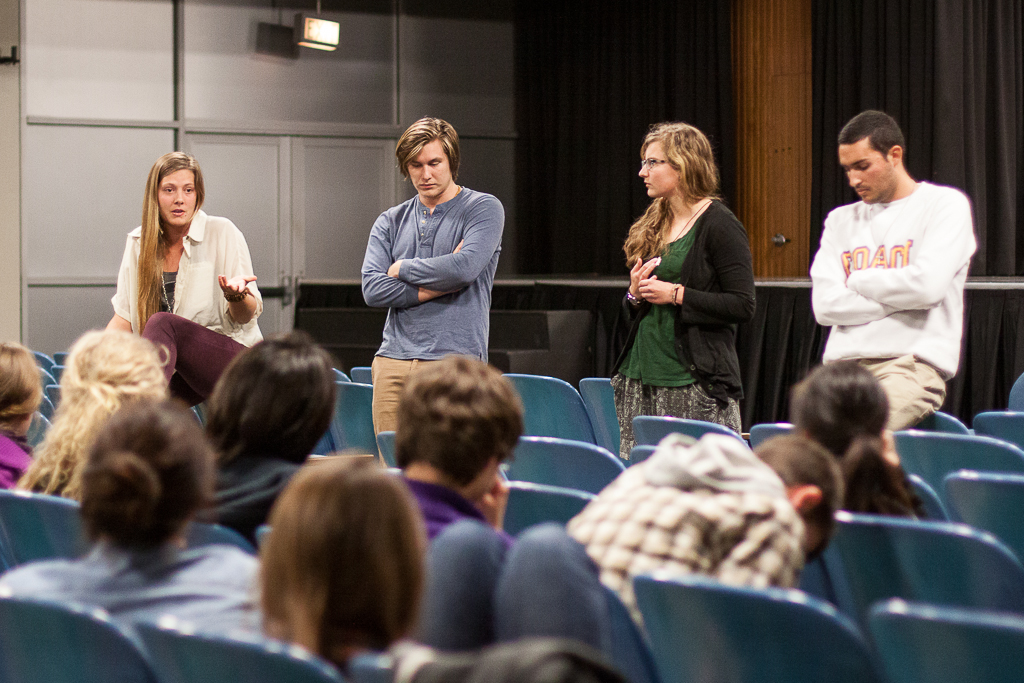
Poverty, despair, sickness and death aren’t just byproducts of third-world countries. For Native American reservations and tribes across the United States, such things are everyday fare. In an effort to draw attention to a need commonly overlooked by the American Christian community focused on overseas mission work, the Student American Indian Fellowship is kicking off their first week as a club by holding a Native American Heritage Week on campus.
While enrolled in a History of American Indians class at Moorpark College, Kyle Quiroz, director of Student American Indian Fellowship, was shocked to learn of the appalling conditions of reservations today. Quiroz became passionately concerned with reaching Native American communities.
“Native Americans [on reservations] have the most suicides, sexual abuse, dropouts, drug abuse, diabetes [cases], and youth mortalities,” Quiroz said. “Why is missions always overseas when these people are here and they are hurting?”
Finding others with a passion for reaching the Native American people
When Quiroz transferred to Biola as a junior intercultural studies major in fall 2011, he hoped to find others students with similar concerns. Disappointed by the absence of Native Americans in Missions Conference 2012 and frustrated by the general lack of campus awareness, he questioned what he perceived to be God’s inactivity at Biola.
“I kept asking God, ‘Why haven’t you brought anyone here and why aren’t you doing anything?’ And God said, ‘That’s why I have you here,’” Quiroz said.
When Quiroz met co-director Jess Lindner — a senior ICS major — in their international development class last semester, he found someone who shared his passion for reaching the broken and hurting Native American peoples. Both planned to live on reservations over the summer, with Lindner interning for six weeks on the Lakota-Sioux reservation in South Dakota and Quiroz ministering to the Northern Arapahoe for a week on the Wind River Indian Reservation in Riverton, Wyo.
Interested in starting a Native American ministry on campus, Quiroz and Lindner took their shared passion and energy to SMU. There, they were connected with sophomore film production major Anna Grace Hodge, who is also now a Student American Indian Fellowship co-leader. Like Quiroz and Lindner, Hodge also planned to spend the summer on a reservation, choosing the Yakima reservation in Washington.
Raising awareness and combating misconceptions
After a summer spent ministering on their respective reservations, Quiroz, Lindner, and Hodge converged at the beginning of this semester to officially launch Student American Indian Fellowship. Their immediate purpose was to combat the misconceptions that plague the American and Christian perception of life on Indian reservations.
“Generally, people aren’t educated about what is going on,” Hodge said. “There are questions of why [Native Americans] don’t just leave the reservations if it’s so bad or … they have a casino, so why would they need anything else?”
The Student American Indian Fellowship utilized the awareness week to provide answers. The week included an information night Monday, a screening of the documentary “The Canary Effect” on Tuesday night and a family dinner featuring Native American food on Wednesday.
Seeking friendships rather than evangelism
The Student American Indian Association's two-pronged purpose for this year begins with the present awareness week, in tandem with Native American Heritage Month. Beginning next semester, they will add action to awareness as they take Biola students to local reservations to build relationships with Native American communities.
Emphasizing fellowship over evangelism, the Student American Indian Fellowship leaders intend to follow a different course from the traditional approach to ministry in Native American communities. Instead of coming onto reservations with an evangelism-focused approach, leaders plan to first make a concentrated effort to establish meaningful relationships with individuals and the reservation’s community as a whole.
“They have been hurt so much by missions from the get-go, that if we come in saying ‘we are here to tell you about Jesus,’ they have heard that before,” Lindner said. “They need to see more of Christ’s love in action.”
Lindner also explained that many on the reservation are reluctant to open up to people who aren’t going to stay.
“The one thing they are sick of are Christians that come in their vans, do their little gospel thing, hop back in their vans, drive away, and [they] never see them again,” Lindner said. “They want consistency, they want long-term relationships.”
Native American Heritage Week concludes tonight with Student American Indian Fellowship and Revive hosting a worship and prayer session in Business 103 from 9 p.m. – 12 a.m.







